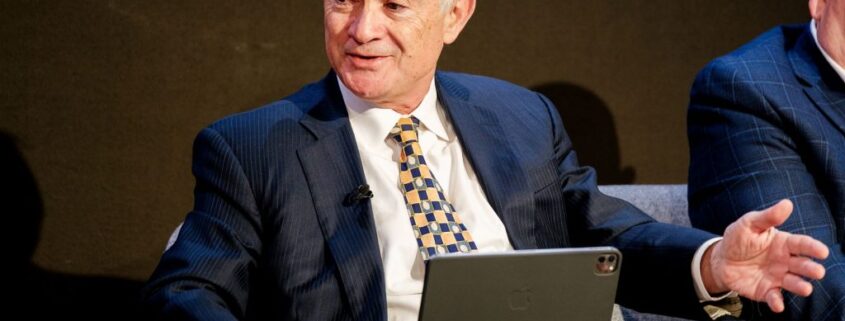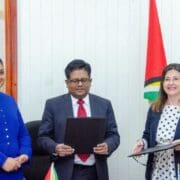ECLAC proposes cluster policies to escape current low-growth trap in region
Black Immigrant Daily News
The Executive Secretary of the Economic Commission for Latin America and the Caribbean (ECLAC), Jos? Manuel Salazar-Xirinachs, proposed cluster-based policies as a powerful instrument to promote growth and productive diversification to help pull the region out of the prolonged, development crisis that has impeded high, sustained and sustainable growth in the last decades, except in cases of price bonanzas in primary products.
The United Nations senior official is in Davos, Switzerland for the 2023 World Economic Forum Annual Meeting (WEF) from January 16-20. The 53rd edition brings together the largest number of world political and economic leaders in its history, including more than 50 heads of State or government, 56 finance ministers, 19 central bank presidents, 30 ministers of trade and 35 ministers of foreign affairs, under the slogan “Cooperation in a Fragmented World.”
In his presentation during the “Sustainable Solutions for Latin America” session on Wednesday, January 18, attended by the President of Ecuador, Vice President of the Dominican Republic and distinguished authorities from the public sector, business leaders and academics, ECLAC’s Executive Secretary stressed that productivity has not grown at all in 30 years in Latin America and the Caribbean, the region of the world with the worst productivity performance in the last 40 years. He added that the average rate of growth in the last ten years (from 2014 through 2023, considering the projection of 1.3% growth for this year) is just 0.9%, or less than half the growth the region had in the infamous lost decade of the 1980s.
“Therefore, this decade will be even more lost than the last lost decade. This is the real developmental crisis of Latin America and the Caribbean: the region has failed miserably in promoting technological sophistication, economic complexity and production and export diversification. The result is that all countries are in the medium-income trap,” he stated. As a result, none have even gotten close to the threshold of $20,000 dollars per capita income.
In this context, Salazar-Xirinachs warned that without growth in productivity, prosperity is not sustainable, the creation of jobs and social policies are not sustainable, social mobility is not possible, and without all this, the reduction in inequality and social pacts are at risk.
“We know that there are no easy recipes for achieving high, sustained and sustainable growth. There are no silver bullets. There is a whole checklist of things that have to be right, such as investment climate, infrastructure, education, macroeconomic balances, good governance, etc. But a solution could be cluster initiative policies or cluster-based policies that could be built from the bottom up, even if some of the factors on the competitiveness checklist are not 100% right,” he explained.
He indicated that clusters are a specific form of public-private partnership that creates a space of governance where all relevant players collaborate to promote competitiveness, job creation, innovation, skills, financing and remove obstacles for the growth of the cluster, sector or agglomeration. The most successful clusters are led by the private sector, with close cooperation of government agencies and educational and training institutions.
“The countries of Latin America and the Caribbean should embrace cluster-based approaches and scale them up in their productive development policies. In this sense, we want to turn ECLAC into a Center of Excellence in Knowledge on cluster policies, among other themes,” specified the organization’s Executive Secretary.
Jos? Manuel Salazar-Xirinachs was one of the key speakers at the WEF session on Enabling an Equitable Transition, held on Thursday, January 19, alongside distinguished panelists who addressed paths for incorporating equality and justice in the transition toward greener, more equitable and inclusive economies.
On this occasion, he emphasized the need to speed up the pace of economic transformations in the region, saying that economic changes, whether induced by trade and globalization, the technology revolution, or by green growth and the big environmental push, are a process of “creative destruction” or structural change where there are sectors, workers and territories that win, and others that lose. And he pointed out that the big public policy challenge to promote a fair and equitable transition is in making the creative aspects of the change come before the destructive aspects, in terms of unemployment and the obsolescence of existing productive capacities.
He added that one of the fundamental aspects for there to be a fair and equitable transition is having major investment in education and training. “One of the greatest restrictions for making the transition toward what’s new is not having the talent and competencies that the new sectors of the future demand,” he said. In addition, he recommended bolstering the active labor market policies to help displaced workers find new employment opportunities through training, re-training and labor reinsertion policies.
Furthermore, in a special column published on the 2023 World Economic Forum Annual Meeting blog, ECLAC’s Executive Secretary addressed how to reverse the cycle of slow growth Latin America and the Caribbean is experiencing. In the article, Salazar-Xirinachs says that average growth for the countries of the region will be 1.3% in 2023, reflecting a structural trap of low growth, elevated inequality, weak institutions and bad governance, combined with adverse international conditions. For this reason, “policy priorities should focus on reactivating job markets, curbing the rising cost of living, improving tax collection and sheltering vulnerable groups, and investing in well-designed social policies and universal health,” he indicated in the article.
Likewise, during his time in Davos, the ECLAC senior official held numerous bilateral meetings with figures from government, international organizations and institutions, and representatives from the public and private sectors, including: Michael Frohman, Vice Chairman and President, Strategic Growth, Mastercard; Rebeca Grynspan, Secretary-General of UNCTAD; Janio Rosales, Minister of Economy of Guatemala; Andr?s Velasco, Dean of the School of Public Policy, London School of Economics; Mathias Cormann, Secretary-General of the OECD; Jos? Antonio Ocampo, Minister of Finance of Colombia; Gabriela Bucher, Executive Director, OXFAM International; David Herranz, Senior Vice President, Manpower Europe, Manpower Group; Lars-Hendrik R?ller, President, Berlin Global Dialogue and Pamela Coke-Hamilton, Director, Geneva Center for International Trade.
Donate At Caribbean News Service, we do not charge for our content and we want to keep it that way. We are seeking support from individuals and organisations so we can continue our work & develop CNS further.
NewsAmericasNow.com










Leave a Reply
Want to join the discussion?Feel free to contribute!